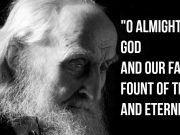In this audio recording, St. Sophrony the Athonite (+July 11, 1993) speaks to his monastic brotherhood about how God’s humility reveals divine love and how the love of a mother reflects this kenotic, self-emptying love.
Essex Monastery, March 2nd, 1992
English translation adapted after the Romanian version of Fr. Rafail Noica, Cuvantari Duhovnicesti I (25).
St. Sophrony:
Holiness is a great thing. And we accustom ourselves to feel as sinners. And this is good. Yet still, the word of God works in us in such a way that even we may become holy. The path to the eternal holiness of our great Creator has not been cut off from us. All has been given to us by the Eternal God, to Whom belongs the great love before all ages.
Thus, through small deeds, we set out upon the path of love for Christ. And the love of Christ—of which St. Silouan did not dare to sing, as being above every mind and every word—of this love of Christ we say that it proceeds from God, Who is humble. Speaking in the language of Holy Scripture, we may say that “God is humility” (cf. 1 John 4:8). And to the humble God belongs humble love, not a love from on high. And when we speak of such humility, we are speaking also of self-emptying. The humble love of God—because He is humble—makes love kenotic. God, Who by His Word created all that is, became incarnate and lived, humbling Himself unto limits beyond our reach. This is the mark of the love of God: it is self-emptying, kenotic. Thus the Lord, that His word might be received, before His crucifixion on Golgotha washed the feet of His Apostles and said: “I have given you an example, that you also should do as I have done to you” (John 13:15).
In human love there is one love which, more than all other human expressions, draws near to this kenotic Divine love—and this is the love of a mother: she endures all things from her little child; she is ready for every form of service to her infant, however humiliating. This is the kenotic love of a mother.
And so the Lord humbles Himself before us as a mother before her child. If He had appeared to us in His might, we would have been afraid to approach Him, afraid even to look upon Him. But so as not to terrify man, He took upon Himself our bodily being, our existence—in other words, our “being” (a seldom-used Russian word which, as a philosophical term, corresponds to the concept of existence).
And behold, when for the love of Christ we are suddenly filled with the vision of the majesty of Divine humility, then the seal of God is set upon us, and our life may become holy and full of majesty, despite all its servile forms in which this kenosis—this self-emptying—is expressed.

 Română
Română



































